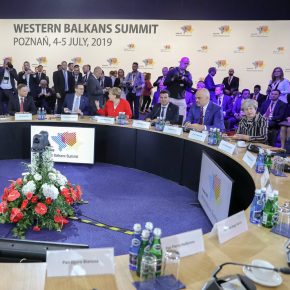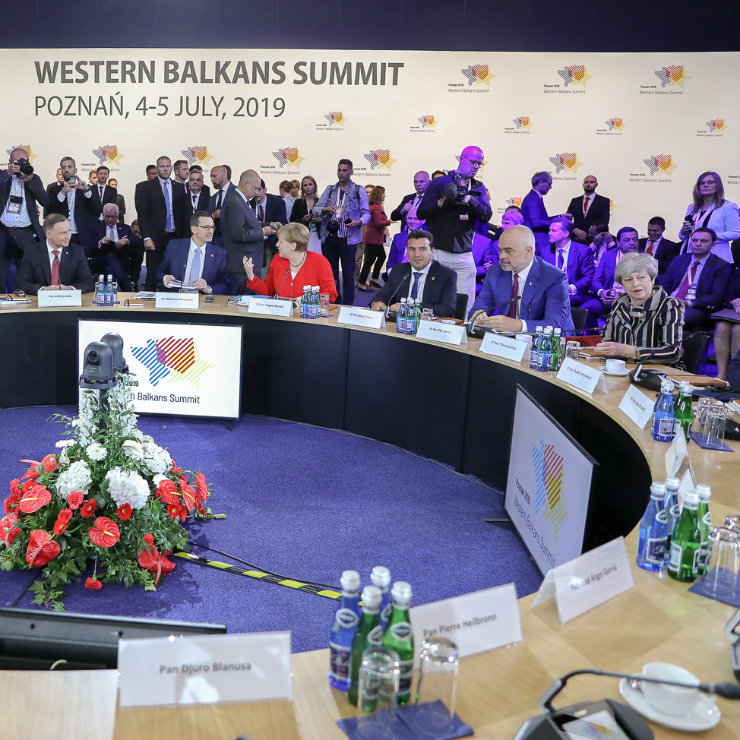Tydzień w gospodarce
Category: Trendy gospodarcze
Analyst, journalist specializing in the Western Balkans and Middle East domestic and foreign affairs

Western Balkans Summit, Poznan, Poland (Jakub Szymczuk/KPRP, Public domain)
The idea that Serbia’s President, Aleksandar Vučić has been advocating for several years has so far been just a thought. In the meantime, there were various barriers to the economic realisation of such a plan. Goods from Serbia had obstacles on several sides, and the most recent well-known case is a tax war with Priština(read more), with taxes of 100 per cent.
This is why the announcement that Serbia will work on the economic unification of the Balkans would raise the question of how realistic the plan is. Serbian President spoke about the customs union of the Western Balkan countries, which was accepted by some parties, but some did not. For some, it has been too much like a state union, now the discussion is more about a regional market, which is more than CEFTA. The unique regional market would be similar to the free market of goods, services and capital, but also of labour force. This can mean mutual recognition of university diplomas, professional qualifications, freedom of movement. Also borders would no longer be a barrier but would be as open as in the EU countries, which gives strong impetus to economic and trade activities in the region. But for these initiatives and ideas a comprehensive agreement of the regional countries supported by the EU is needed.
All Western Balkan countries have not yet used their potential trading opportunities with the region or with the economies of the EU. The CEFTA agreement has also led to an increase in trade among the countries of the region. Concerning the effect of the CEFTA agreement on individual countries, it had a significant impact on the import and export of all the countries of the Western Balkans. CEFTA agreement could further approximate Member States and help them to better integrate trade during transition to the EU membership. However, it is clear that CEFTA did not meet interests and ambitions of many member states.
Advisor to the President of the Serbian Chamber of Commerce Nenad Đurđević points to the undoubted advantages of unifying economic cooperation. He illustrates this by the fact that the Balkans consists of six economies and 18 million inhabitants. If we compare this with Slovakia, which has three times fewer inhabitants, and the same GDP as the entire Western Balkans, then it is clear how much the region is lagging behind some developed countries.
The only opportunity for competition and the possibility of attracting investors is to see the whole region of the Western Balkans as one economic community and to be more attractive to both domestic investors and international ones. Such fragmented markets, with such a large number of borders, different regulations, different degree of harmonization vis-à-vis the European Union, make the business much more difficult and uncompetitive on the world market.
Mr. Đurđević believes that without a single joint plan, called a “New Balkan Deal”, the development opportunity will be missed, regardless of whether in the near or far future all countries will be EU members. „At the Western Balkans summit in Poznan (Poland) this year, we presented the views of the six chambers of the Western Balkans on the implementation of economic integration, or the so-called economic plan for the integration of the Western Balkans, which was adopted two years ago in Trieste. And every year we look at the action plan, which was adopted at that time,” he emphasized.
He regretted that many things were not fulfilled and that they were in a hurry to achieve the goals set by the governments. „The adoption of this new agreement for the Balkans, as a common policy of six economies, where six countries become a common investment space, is important,” Mr. Đurđević said, pointing out that such an idea was presented in London and planned by the end of the year to do so at summits in Berlin and Italy. „It is part of the common attitudes and we met with our Government, we met with the EU representatives and we will continue to work on that. We will focus on sectoral policies, to see how we can work across sectors and what are the common sectors for all six countries to jointly make development projects, „Mr. Đurđević said.
He, however, points to problems in the realization of this idea. „The biggest obstacle, which is of a political nature, is stemming from the legacy of the war of the 1990ties. I think that this, without a detailed plan, unfortunately, will not be realized. In order to consolidate the market and create a wider economic zone, it is necessary to have a conversation of equal participants,” Mr. Đurđević added.
This is also the opinion of the many Serbian economists who think that this is a great idea and that in the long run, it is the only way for people and countries of the region to start working in a normal way, like it is happening in the rest of Europe. One does not need to be too wise to understand that everyone would benefit from the one economic zone. Essentially, hardly anyone could say that it will not benefit from it. But since people in the Balkans are quite irrational, they do not only look at the benefits, but more often how much will the neighbor earn. At this moment, apart from Serbia, absolutely no one in the Balkan region is able to approach the customs union or customs-free zone.
Many economic analysts agree that the region will have a big problem if the area will not finally create a single market and if it does not remove the obstacles for an undisturbed trade. At the local level, the capital markets in the region have not yet assumed their place and role, and the regional level requires deepening the mutual cooperation, i.e. achieving a better position in future integration with the more developed markets. Most of the analyzed countries had positive economic trends, but the pace of their development is different.
Last year, in Slovenia, Croatia, Serbia, Bosnia and Herzegovina, Macedonia and Montenegro domestic consumers were a driving force of economic development. Private consumption increased thanks to the reduction of unemployment, i.e. the growth of the living standards of the inhabitants of this territory. All listed factors together have positively impacted the development of regional enterprises.
The founding of the first joint economic institution in the region, the Investment Forum Chamber, consisting of chambers of commerce included in the Berlin process — Albania, Bosnia and Herzegovina, Montenegro, Kosovo, Macedonia and Serbia, as well as the Chambers of Croatia and Slovenia — makes a significant progress on connecting economies, but for further networking a stronger support from politicians at the highest level is necessary. The political situation in the Western Balkans does not allow the business community to make progress and to expect creation of a more favorable business environment that would contribute to greater competitiveness of the region’s economy.
Additional problem is that Croatia has met all formal requirements for entry into Schengen. Croatia has so far been on its way to Schengen, which is one of the two priorities after joining the EU. However, the Commission’s confirmation of the fulfilment of all conditions does not mean the end of the road. Some member states may still block Croatia’s entry into Schengen. As seen in the process of EU enlargement and expansion of the Schengen zone, some states may block or delay for political reasons. Slovenian foreign minister Miro Cerar has said during the latest UN General Assembly in New York that Slovenia was in favor of expansion of the Schengen area but only if Croatia respected the rule of law. Even greater problem than Croatia’s entry into Schengen will be Bulgaria and Romania. These two countries received the green light of the European Commission for Schengen entry five years ago, but they were blocked by some states, above all the Netherlands, but also France and Germany.
Vedran Obućina is an analyst and a journalist specializing in the Croatian and Middle East domestic and foreign affairs. He is the Secretary of the Society for Mediterranean Studies at the University of Rijeka and a Foreign Affairs Analyst at The Atlantic Post.

